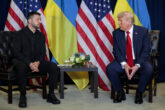July 06, 2022
Why Russia Must Fail in Ukraine
The post-Cold War era that began in 1991 ended on February 24 of this year. That day, as Russian troops swept into Ukraine, Vladimir Putin unleashed massive brutality on a sovereign neighbor. Amid the first state-on-state land war in Europe since 1945, the stakes immediately became clear, in Washington and beyond. Then, and today, Ukrainian lives and independence hang in the balance. So too do those institutions and rules that govern, if not always effectively, international behavior. In this new era, world order itself is at risk.
Much recent American debate has focused not on the benefits of international order but on its costs. Defense spending, alliances and military pacts, diplomatic deals, international economic arrangements—all are easy to dismiss as the obsolete manifestations of a Cold War mentality, or the hubris of U.S. leadership, or the conceit of those who overlook the interests of average Americans. Some argue that the very existence of any liberal order is mythical, just another chimera bound to entangle the United States in faraway places about which we know little.
Should Moscow’s violent revisionism succeed, it would threaten the very principles that have helped create peace, prosperity, and freedom over more than half a century.
Yet international order is like the ground beneath one’s feet: ignored, taken for granted, and indispensable. When it shakes violently, as it is today, that order galvanizes attention and elicits mighty efforts at stabilization. National will matched to national power—America’s above all others—is required to dampen the earthquake.
The alternative to an ordered world, and to countries shouldering the cost of its defense, is the law of the jungle, where big countries can take territory, impose their rule, and spread chaos at will. That is the world Russia seeks, and China appears seized by a similar impulse. The prohibition against forcible conquest is at the very core of liberal order, and it is precisely that norm that is at risk today. Should Moscow’s violent revisionism succeed, it would threaten the very principles that have helped create peace, prosperity, and freedom over more than half a century.
Read the full article from The National Interest.
More from CNAS
-
The Return of Diplomacy to Great Power Competition
On the surface, great power competition often seems driven by economic and military conflict, but diplomacy has always been central to great powers' engagement with the world....
By Andrea Kendall-Taylor & Jim Townsend
-
What’s Driving President Trump’s New Confidence in Ukraine’s War Effort
President Trump dramatically declared on social media that he now believes that Ukraine can reclaim all its land from Russia, which he described as a paper tiger. From the Ova...
By Richard Fontaine
-
Moldova Chooses Its Future with William Hill and Laura Thornton
On September 28th, Moldovan voters went to the polls in parliamentary elections to choose between competing visions for their country's future. Despite intense efforts by the ...
By Andrea Kendall-Taylor & Jim Townsend
-
Europe Must Counter Cheap Drones with Cheap Solutions, Ex-NATO Commander Says
NATO must find cheaper ways to counter the growing threat of Russian drone incursions, the former Supreme Allied Commander for Europe, Gen. Philip Breedlove, has said. Speakin...
By General Philip M. Breedlove




